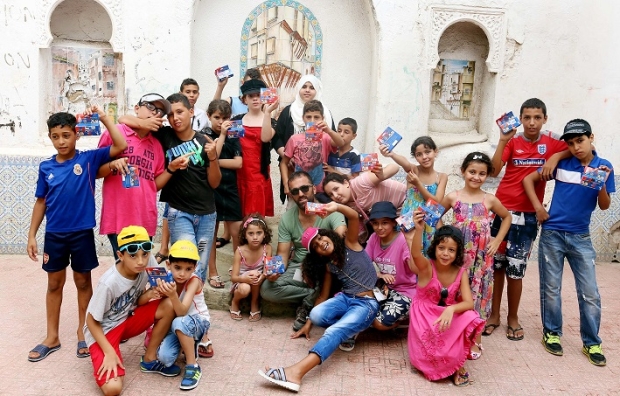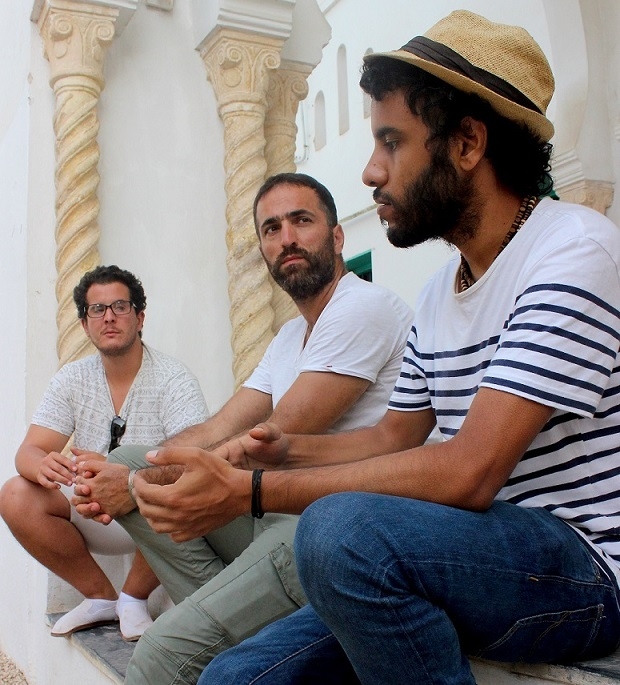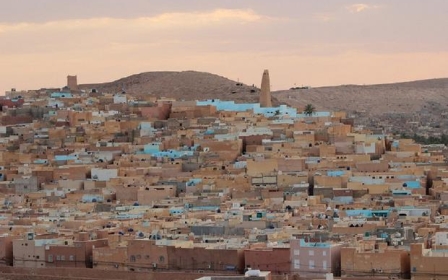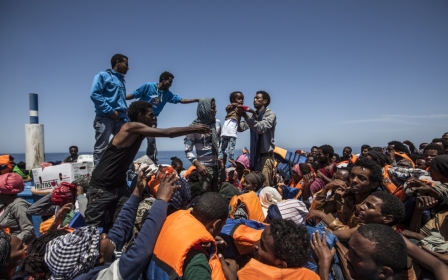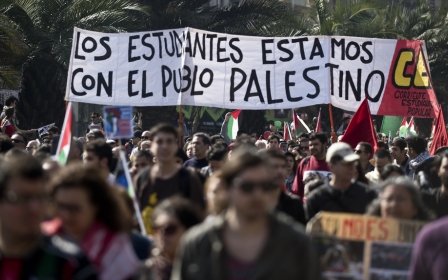Between Algeria and Palestine, there is much more than politics
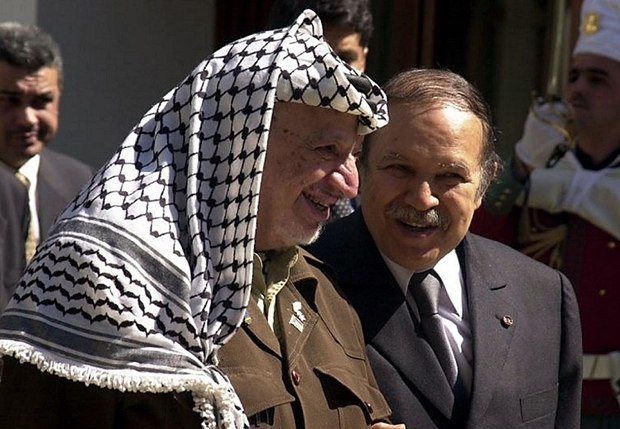
ALGIERS - "When we posed for a group photo, all the children shouted in unison: ‘Palestine!’”
Khaled Jarrar is not a man who smiles a lot. But at the mention of this scene, his face lights up. Yasser Arafat's former bodyguard, who is now a director, performer and photographer, has found a new source of inspiration: Algeria.
Last week, Jarrar arrived in the country for an artist-in-residence programme. He seeks to bring the Palestinian and Algerian struggles closer together. Jarrar began distributing disposable cameras to children of the Algiers’ Casbah in order to organise a traveling exhibition using their shots. "I see my work as a way to break the boundaries," he told MEE. "Despite the distance, Algeria and Palestine are very close. I'm not just talking about fraternity between our two peoples, but [our] history."
Flashback: On 13 November 1974, PLO chairman Yasser Arafat was invited to the 29th session of the United Nations General Assembly that was then chaired by a young Algerian minister of foreign affairs, Abdelaziz Bouteflika. In a historic speech, the PLO leader praised the future head of the Algerian government for showing support to the Palestinian cause.
"It must be understood that at the time no one supported the PLO, which was considered a terrorist movement," said an Algerian diplomat contacted by Middle East Eye.
"No Palestinian official had made a speech at the UN since the partition plan in 1947! It was thanks to Algeria that the issue was back on the table and that, in 1988, the PLO adopted a motion to initiate talks with Israel. No other state has ever been as involved with the Palestinian cause and I can tell you that at that time we didn’t make only friends."
International pressure
Abdelaziz Rahabi, then spokesman of the Algerian Ministry of Foreign Affairs, remembers November 1988 as though it was yesterday. Algiers hosted members of the Palestinian National Council, despite international pressure not to do so.
"The United States had recommended not to receive them. Several [PNC members] were chased by intelligence services around the world,” Rahabi told MEE. “Among them was Abu Daoud, [who planned] the hostage-taking of Israeli athletes at the Munich Olympics in 1972, and one of the Palestinians who hijacked the Achille Lauro cruise ship in 1985."
It was also in Algiers that Arafat proclaimed the creation of a Palestinian state. "It is like that," said the former diplomat, without regret. "We always made sacrifices for the Palestinians, which has caused us numerous hostilities, including in the Arab world."
Jarrar prefers the facts of history over politics. “Like us, the Algerians have been oppressed and suffered from occupation," he says. "Their fight for freedom is still today an example to most Palestinians."
In 2010, four months after the Israeli navy conducted a deadly attack on the Turkish Mavi Marmara flotilla that attempted to break the siege on Gaza, the Algerian Islamist Party (AIP) dispatched a humanitarian aid convoy to the Palestinians.
"As Algerians, we have lived under a colonisation that is very much similar to the Israeli occupation: the French usurped our land, alienated the society and humiliated our parents ... It is therefore natural for us to be involved," Abderrazak Makri, now president of the party, told the Algerian newspaper, El Watan.
Fares, an Algerian who has been living in Gaza for 21 years, analyses this relationship with great humour. "When I see the Algerians’ reaction, always ready to demonstrate in solidarity with the Palestinians and to show their sympathy on social media networks, my conclusion is that this relationship is really 'sentimental,'" he told MEE.
However, he is more nuanced regarding the official position. "Algeria remains, of course, one of the best supporters of the cause. But its relationship with Palestine is not as strong as it used to be. A Palestinian who wants to come to Algeria now needs a visa; this was not the case before. The irony is that there is no Algerian diplomatic representation in the Palestinian territories!"
On the other hand, Algiers says that opening an embassy or a consulate in the occupied territories would constitute recognition of the status of the occupier.
There have been a few cold periods. Palestinian Authority President Mahmoud Abbas did not visit Algeria for nearly 10 years following statements made by the Algerian president, who urged Palestinians to "solve their problems by themselves”.
But since Boumediene’s famous statement, "We support Palestine, whether it oppresses or it is oppressed," Algiers has never missed an opportunity to emphasise that it remains engaged.
"Algeria has always provided assistance of all kinds to Palestine, well before other countries did,” Prime Minister Abdelmalek Sellal recalled last year. In the summer of 2014, the Algerian Red Crescent provided the Gaza Strip “with medicine and medical supplies" as it was being targeted by Israeli warplanes. Popular gatherings were organised throughout the country and the Algerian Republic presidency had called for a moment of silence on 31 July 2014, urging companies to cease all activity for five minutes. It had allocated an emergency package worth $25mn as humanitarian aid to Gaza.
‘Principled and inalienable position’
"One must admit it," said Abdelaziz Rahabi. "Since 1964, Algeria, which pays its annual contributions in time to the Palestinian Authority, has never used the funds to demand anything in return.”
In Cairo, in early August, Abdelkader Messahel, Algerian Minister for Maghreb Affairs, African Union and the Arab League, reiterated "Algeria’s principled and inalienable position and its full commitment towards the Palestinian people and their legitimate rights to establish an independent state with Jerusalem as its capital".
Last week, the showing of the Infiltrés, Khaled Jarrar’s documentary film, which won awards at the international festivals of Dubai and Chicago, was unsurprisingly greeted with emotion by the Algerian audience. For Haitham Amaire, a representative at the Palestinian Embassy in Algiers, this was an opportunity to insist on the need to show in pictures" a reality, that of the occupation, that Algerians cannot witness by themselves since they cannot come to us. We know that this has an impact because our two peoples are one."
Arslan Naili, a designer, and Yasser Ameur, a street artist - the two Algerian artists who accompanied Khaled Jarrar during his stay - have realised this on their own.
"The fact that he is Palestinian facilitates exchanges. We notice it in the neighbourhoods we walk through people immediately feel concerned," they told MEE.
Jarrar told MEE: "I am touched by the welcome that people extended to me and by the dialect I don’t always understand, so poetic and so musical. I look forward to returning to Algeria."
This article was originally published on Middle East Eye’s French page on 19 August 2015 and was translated into English by Ali Saad
Middle East Eye propose une couverture et une analyse indépendantes et incomparables du Moyen-Orient, de l’Afrique du Nord et d’autres régions du monde. Pour en savoir plus sur la reprise de ce contenu et les frais qui s’appliquent, veuillez remplir ce formulaire [en anglais]. Pour en savoir plus sur MEE, cliquez ici [en anglais].


